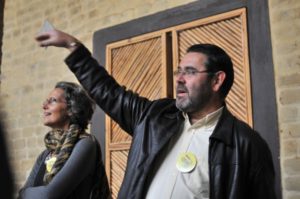Stemmet was interested in the UDF [United Democratic Front] as well. Local elections were to be held in October [of 1988]. He thought that in some municipalities the UDF would stand. In others they probably would not. He noted, “I have no doubt, however, that after the October elections we will have to deal with UDF and ANC sympathies within majorities in Councils. That was a reality, he noted. He also noted, with regard to gray areas, [Grey areas were areas of cities illegally populated with black South Africans] people are just going to have to get used to these areas and all that they represent. The end of the Group Areas Act will probably come after the October elections. Finally the NSC representative commented, “Government moves too slowly. We have to push them- kick them in the teeth sometimes.” [The Bureau of State Security or BOSS was created by then Prime Minister, B.J. Vorster in 1969).
August 6, 1988
In 1988, I had a number of discussions with Mark Swilling about Constitutional Development. One discussion occurred on August 6. The key to change in South Africa he said is that reform must be from the bottom up. The mistake in 1983 was that it was top down. With regard to reform, there are a number of negotiating options being discussed. The right wing option is to put together local alliances on the basis of a constitutional model. Through the primary stages, the RSCs [Regional Services Councils] are the building blocks. The strategy here is that reforms according to the Botha Government should be linked to the joint security centers. The state is committed to reforms linked to current hierarchical structures. He noted that some state officials can be building blocks to majority rule. There is a reformist view within government. Others would oppose majority rule. For government, there need to be ethnic nationalities built into the system. When there is a critical mass of reformers within government, changes will take place. The reformer group has not reached the peak of its influence. The numbers are increasing. The issue is one of generation. The older group comes from Stellenbosch in the 1950s. The younger guys come from Potchefstroom and Stellenbosch now.
In 1988 Mark Swilling was a young, activist academic at the Center for Policy Studies of the University of the Witwatersrand and Planact, a civil society support group. He is shown here with his wife Eve Annecke. They jointly head up the Stellenbosch University’s Center for Sustainable Development.
On RSCs, those taxes are important. The white rate payers are important here. At the local level, the key is that any unitary system must include the townships. Councils came “out of the blue” in 1984. The government thought that black moderates wanted an elected council. There was initially a high turn to in the PWV. That was to be key to Botha’s nation building idea.


